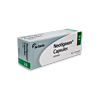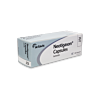Soriatane
(Acitretin)-
All Strengths
-
10mg
-
25mg

Soriatane 10mg
Marketed as Neotigason in United Kingdom

Soriatane 25mg
Marketed as Neotigason in United Kingdom

What is a generic medication?
Generic medications are significantly discounted copies of brand name medication that have the same active ingredients, intended use, dosage, side effects, effects, and route of administration as the original brand name medication. In other words, generic medications have the same pharmacological effects as their brand-name counterparts. Over half of all prescribed medications are for generic medications.



Soriatane Helps Treat the Following Conditions:
Psoriasis
Psoriasis is a skin disease that manifests as red plaques covered with white scales. It is caused by skin cells that multiply with abnormal speed and usually appears on the knees, elbows and scalp. The torso, palms and soles of the feet may also be affected.
Marketed Internationally as Neotigason
In some countries Soriataneis sold under the brand name Neotigason.
SoriataneActive Ingredient
Generic Soriatane Alternative: Soriatane
Soriatane contains the active ingredient acitretin, a retinoid. Medications in this group are derivatives of vitamin A, commonly used to treat skin conditions.
General Drug Information
What is Soriatane and What Is It Used For?
Soriatane is prescribed to adult patients suffering from severe psoriasis and other skin disorders. It contains the active ingredient acitretin, a retinoid.
Usage and Application
Before starting treatment, patients should read the medication guide provided by their pharmacist. They should also read and complete the Patient Agreement and Informed Consent Form.
Most patients are prescribed one daily oral dose, usually with the main meal of the day. The medicine should be taken at the same time each day, exactly as prescribed. Dosage depends on the patient’s condition and response to treatment. Patients should not increase their dose or take the medication more often without consulting their doctor. This increases the risk of negative side effects.
Patients should use Soriatane regularly in order to experience its full benefit. It may take as long as three months before patients see the full benefit of this medication.
Soriatane, the active ingredient in this medication, can be absorbed through the skin or lungs. Women who are pregnant – or may become pregnant – should not handle this drug or breathe dust from Soriatane capsules. This may harm an unborn baby.
Delayed and Omitted Doses
Patients who miss a dose of Soriatane should take it as soon as they remember. If this happens near the time for the next dose, patients should skip the missed dose and proceed as usual. Patients should not double up the dose in order to catch up.
Other Medications and Soriatane
Drug interactions may change the way Soriatane works, and can increase the risk of side effects. Before starting treatment, patients need to discuss the full list of medications and supplements they are taking with their doctor. Patients should not change their dose or stop taking this medication unless their physician advises them to do so.
Some products – like vitamin A, St. John's wort and tetracycline antibiotics – may interact negatively with Soriatane. This also includes Rheumatrex, a cancer drug used to treat psoriasis and rheumatoid arthritis.
Adverse Reactions
Many patients are able to take Soriatane safely without serious side effects.
Some patients may initially experience redness, itching, scaling or peeling of the skin, as well as dry skin as the body adjusts to the medication.
Additional side effects may include dry mouth, chapped lips, or skin peeling on fingertips, palms, and soles of the feet. Some patients may experience runny nose, increased thirst, taste changes or hair loss.
Due to possible dry eyes, irritation and crusting eyelids, patients may find it uncomfortable to wear contact lens.
Serious side effects include decreased night vision, fever, chills, dizziness, bone and joint pain, swelling or sudden weight gain. It is possible to experience muscle pain or difficulty moving. Patients should monitor for signs of kidney problems, such as changes in the amount of urine.
Serious allergic reactions to Soriatane are rare, yet patients should be aware of allergic symptoms such as rash, itching and swelling, severe dizziness and trouble breathing.
How to Store Soriatane
Soriatane should be stored at room temperature, away from light or moisture. Do not store in the bathroom. Keep away from children and pets.
Unwanted medication should be disposed of properly and should not be poured into drains or flushed down the toilet. Patients should consult a pharmacist or their local waste disposal company to find out more about safe disposal methods.
IMPORTANT DISCLAIMER: All medical content is supplied by a third party company who is independent from this web site. As such, this web site can not guarantee the reliability, accuracy, and /or medical efficacy of the information provided. In all circumstances, you should seek the advice of a health professional pertaining to drug, treatment and/or medical condition advice. Note that not all products are shipped by our contracted Canadian pharmacy. This website contracts with dispensaries around the world that ship products directly to our customers. Some of the jurisdiction include but are not limited to United Kingdom, Europe, Turkey, India, Canada, Vanuatu, Mauritius, and USA. The items within your order may be shipped from any one of these jurisdiction depending on the availability and cost of the products at the time you place your order. The products are sourced from these countries as well as others. Please note that the product appearance may vary from actual product received depending on availability.
